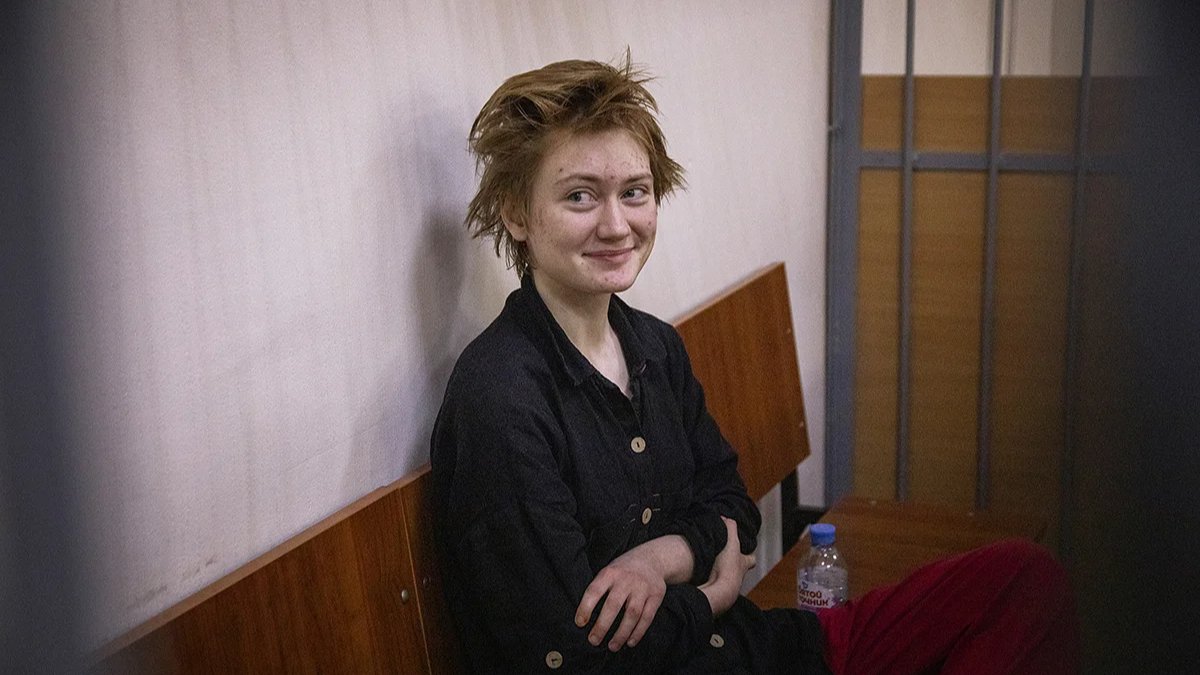A former medical student at St. Petersburg State University who was accused of “repeatedly discrediting the Russian Armed Forces” in January is to remain in pretrial detention until at least the end of April, and faces up to five years in prison if found guilty of the charges at trial.
This article was first published by Novaya Gazeta Baltiс.
Louder than words
Since childhood, Darya Kozyreva was always “very independent, confident and self-motivated”, according to her mother, Marina. “Once my daughter turned 18, I no longer had any control over her. She made her decisions with or without my say so. She almost always knew what she wanted.”
After the war began, it was Darya who took the decision to become a doctor, reasoning that during wartime medics were the people best able to do the most good for others. She was accepted into the medical faculty at St. Petersburg State University shortly afterwards.
“I got it into my head that I wanted to save people and bring them back from the brink of death,” Kozyreva told independent St. Petersburg news site Bumaga in January. “But by the end of my first term I was no longer so sure that a career as a doctor was right for me. And they didn’t give me a chance to reconsider, anyway.”
Russia’s full-scale invasion of Ukraine not only prevented Kozyreva from finishing her studies, it changed her entire life.
“Dasha put a dove of peace on her VK avatar on day one of the war” recalls her boyfriend Denis Garadzhayev, using the diminutive form of her name. “The war put her into an extremely volatile emotional state as she’s not the kind of person who can look at such things with indifference.”
While Kozyreva did not take part in public protests against the war, Garadzhayev said she was “horrified by what was happening” and started writing anti-war social media posts almost immediately after the invasion.
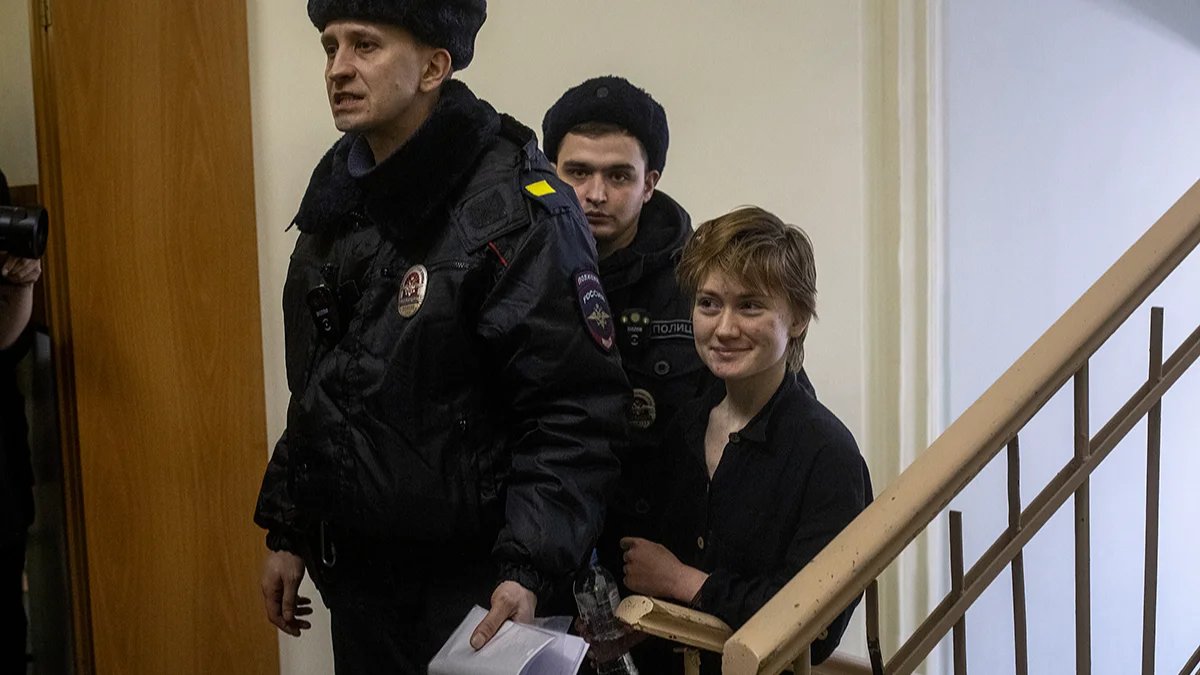
Darya Kozyreva in court. Photo: Dmitry Tsyganov
One of Kozyreva’s sharpest statements was in response to Russian President Vladimir Putin’s September 2022 “partial” mobilisation announcement: “Is it possible that this vile panopticon, the creatures sitting in the State Duma, the creatures that make up the government, the bastard president, have all lost the last remnants of their minds talking about mobilisation? Have they ever had a conscience or known fear?”
Kozyreva put her words into action that summer. On 2 August, she and Denis were walking through a park in the port city of Kronstadt, near St. Petersburg, where Russian nationalists supporters of the war usually gathered. There was a display of military vehicles with the letters Z and V — distinctive propaganda symbols denoting support for Russia’s war in Ukraine — displayed prominently.
“We were right there, in this place, among this public, tearing off the symbols,” Denis continues. “Then we were detained, and Dasha and I received our first charges for ‘discrediting’ the army.”
Denis was given a fine of 30,000 roubles (€300), while Darya’s case did not go to court as she was a minor at the time.
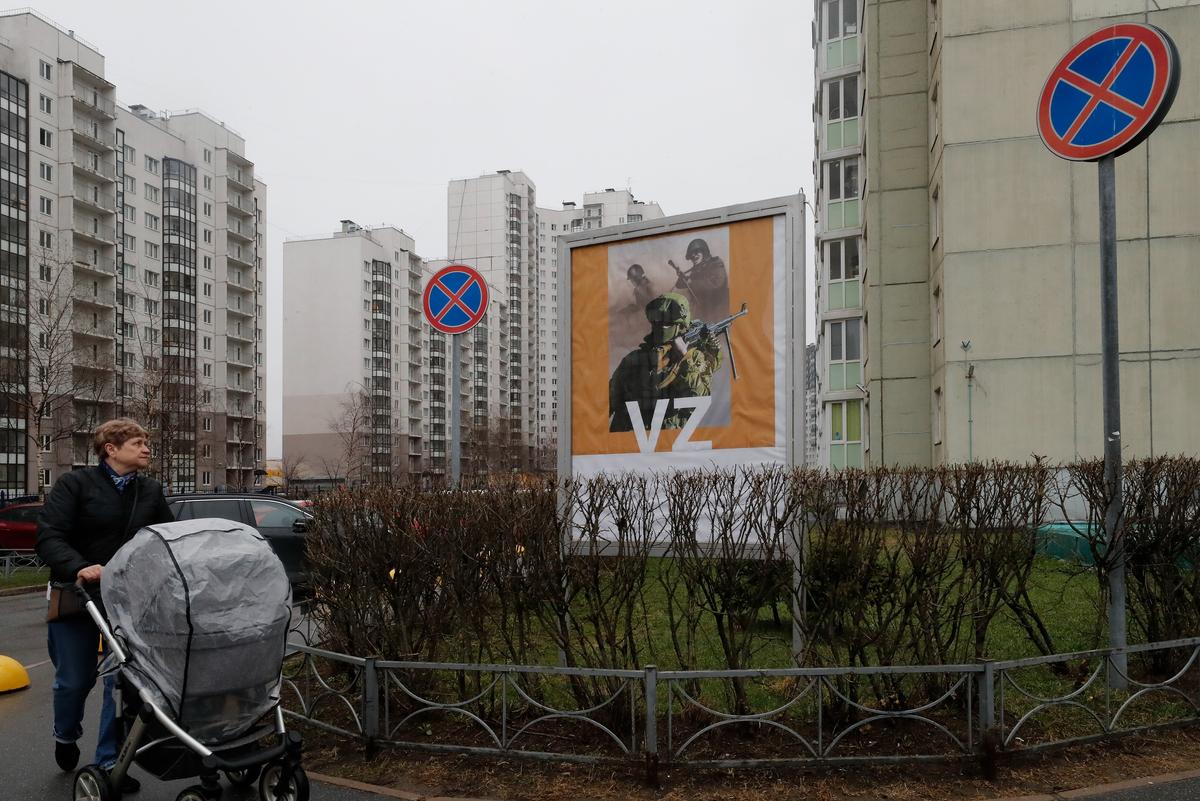
A propaganda poster in St. Petersburg with the letters V and Z on it. Photo: EPA-EFE / ANATOLY MALTSEV
‘Not spoilt, but decorated’
In the run up to New Year’s Eve 2022, an installation in the form of two hearts commissioned by the authorities was theatrically unveiled outside the Winter Palace in St. Petersburg to mark the “twinning” of the city with what remained of the occupied Ukrainian port city of Mariupol, which Russian forces had all but razed to the ground earlier in the year. Darya found the hypocrisy unbearable.
“Dasha didn’t expect to do anything in December 2022,” Denis stresses. “But when she saw what the authorities had done … deliberately choosing the city of Mariupol, which had been wiped off the face of the earth, she exploded.”
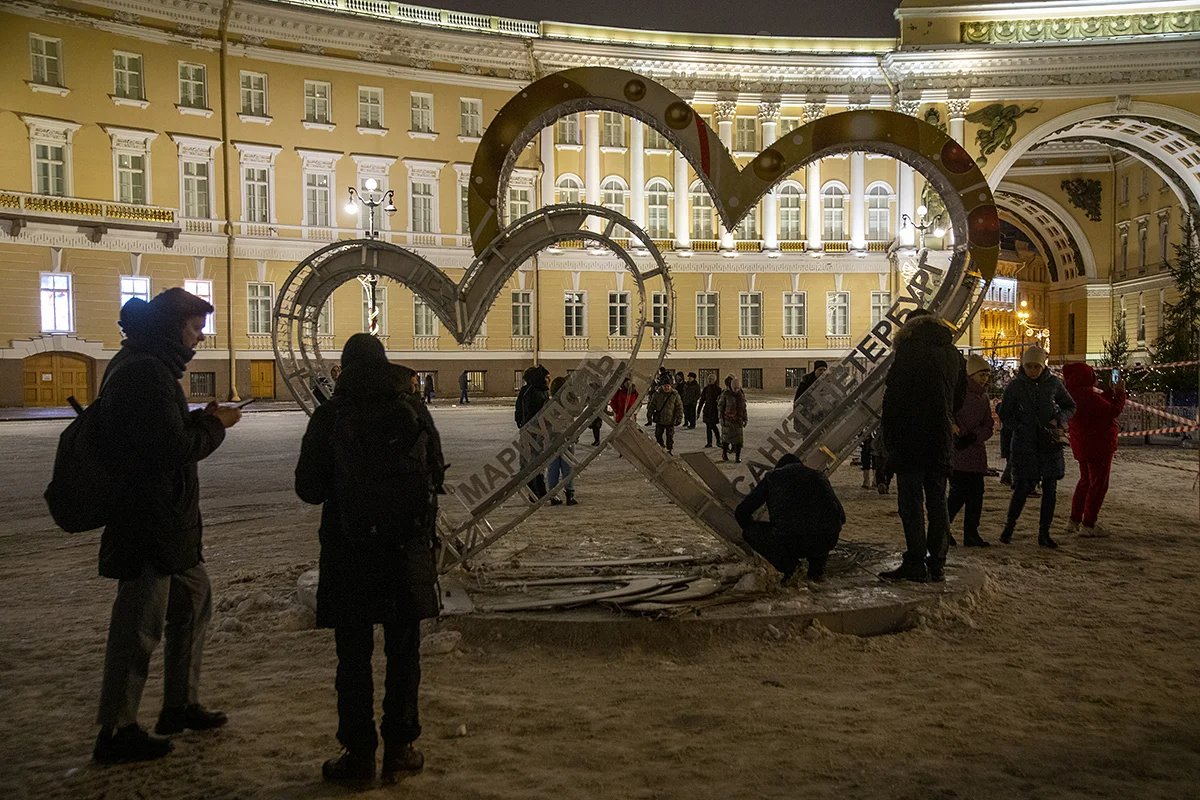
The installation on Palace Square before Kozyreva “decorated” it. Photo: Dmitry Tsyganov
Early in the morning on 18 December 2022, Kozyreva arrived at Palace Square and spray painted the installation with “Murderers, you bombed it. Judas.” She purposely came before dawn, hoping not to be detained, but she was prevented from leaving the square by two rather unlikely enforcers of the law.
“There were no police at the installation or nearby,” smiles Denis, “but some regulars were there — two people impersonating Peter the Great and Catherine the Great. They were the ones who detained Dasha, holding her until the police arrived. To be detained by the imperial family — what a great honour!”
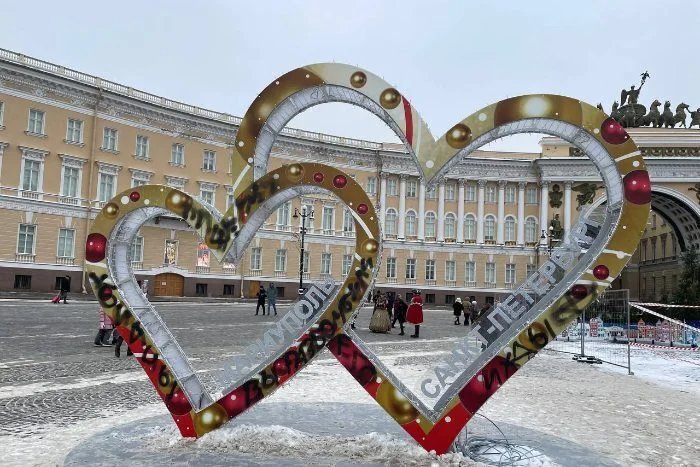
The installation with Kozyreva‘s addition. Photo: Darya Kozyreva / social networks
The owner of the installation was indignant: it claimed that Kozyreva’s act had caused 250,000 rubles (€2,500) of damage. Kozyreva maintained that it hadn’t been spoilt, just “decorated”.
That argument was not accepted by the authorities, however, and a criminal case for vandalism was subsequently opened against Kozyreva despite her still being 17. However, while Darya was summoned several times to the Commission on Juvenile Affairs to provide an explanation for her behaviour, she was not ultimately charged.
Expulsion
When Kozyreva suddenly found herself being charged for “discrediting the Armed Forces of the Russian Federation” in December 2023, the news came as a shock, mainly as the case was based on something she had posted on Russian social media network VK almost two years beforehand.
In the post, Kozyreva addressed the adoption of new laws that criminalised “discrediting” or spreading “false information” about the army, saying that they would ensure the authorities would now be able to give their critics “real prison sentences”. Despite writing the post before the new laws came into force, Kozyreva was fined 30,000 rubles (€300) for them by the court.
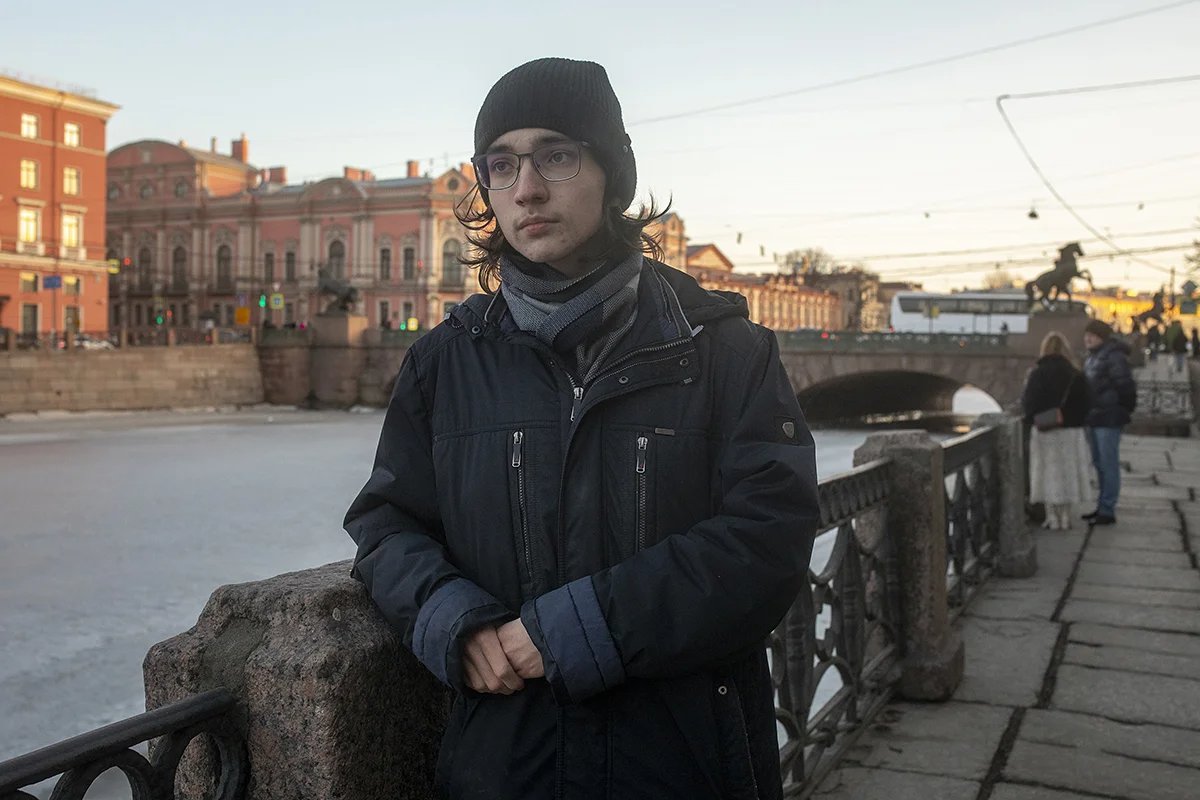
Denis Garadzhayev, Dasha‘s boyfriend. Photo: Dmitry Tsyganov
Pleading not guilty to the charges, Kozyreva told the court “I simply wrote what I thought about these monstrous laws and the war in Ukraine. My post is correct and honest. I do not plan to delete it even after all this.”
However, upon learning of her conviction, St. Petersburg State University expelled Kozyreva without hesitation. “There was no ethics commission, they just sent me a dismissal notice stating that my behaviour contravened the university’s charter, which prohibits violating Russian law,” Darya later explained.
Symbolism of Shevchenko
On the second anniversary of the war with Ukraine, Kozyreva laid flowers at the St. Petersburg monument to her favourite poet, Taras Shevchenko, often dubbed the father of the Ukrainian nation. She also left a handwritten excerpt from his poem Testament reading: Oh bury me, then rise ye up / And break your heavy chains / And water with the tyrants' blood / The freedom you have gained.
Kozyreva said she did not expect to be detained, let alone subjected to criminal charges for what she did.
“I remember how the day before I said ‘they won’t put me in jail for Shevchenko!’ I thought even they would be too ashamed to send someone to prison over a 19th century Ukrainian poet. Well, our law enforcement system … has reached a Kafkaesque level of absurdity,” wrote Kozyreva recently in a letter from her detention centre to a friend.
“On the morning of 24 February, Dasha told me: ‘If there are police officers at the monument, I will just leave the flowers and go back with the poem tomorrow,’” Denis recalled, describing this as a “rare case of her caution showing through”.
“Dasha wanted to be free for the presidential election … I think she would have probably spoiled the ballot paper and taken part in the Noon Against Putin protest,” he added.
But later that day, he received a selfie of a smiling Kozyreva in the back of a police van.
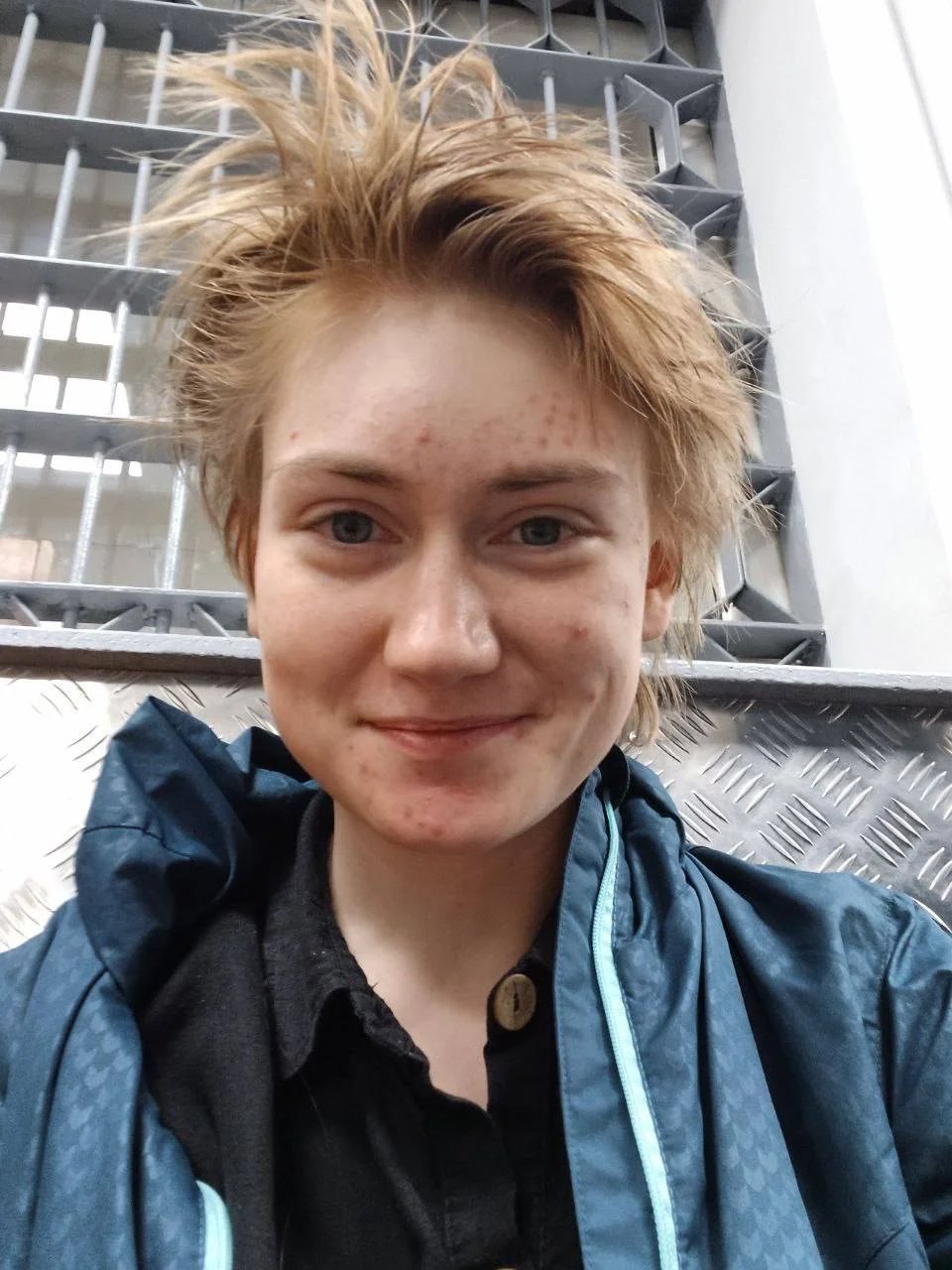
Dasha’s selfie from the police van on 24 February 2024.
Kozyreva’s lawyer Rafael Polyakov maintains that the authorities are yet to provide any evidence that Dasha committed a crime under Russian law, and described the charges against her as far fetched and baseless. “Shevchenko’s poems were written more than a hundred years ago. It is not even a banned work, it was studied in high school,” he added.
‘When I’m told to be silent, I will speak’
Dasha’s friends and relatives all describe her as someone prepared to suffer for her beliefs, and that over the past two years she had found it very difficult to restrain her impulses to speak out.
“Dasha said many times that she understands perfectly well the kind of things people can be imprisoned for in Russia today. So what options does she have? Giving in to fear forces you to curb your soul. And she couldn’t do that,” one of Kozyreva’s former teachers, who wished to remain anonymous, told Novaya Gazeta Baltic.
“We asked her: ‘Dasha, what’s the point of going to jail? You could have achieved something. What can you do there?’”
Kozyreva answered: “I’m not afraid of prison. I think going there is an action, a deed in itself. I want them to see that I’m not afraid of them.”
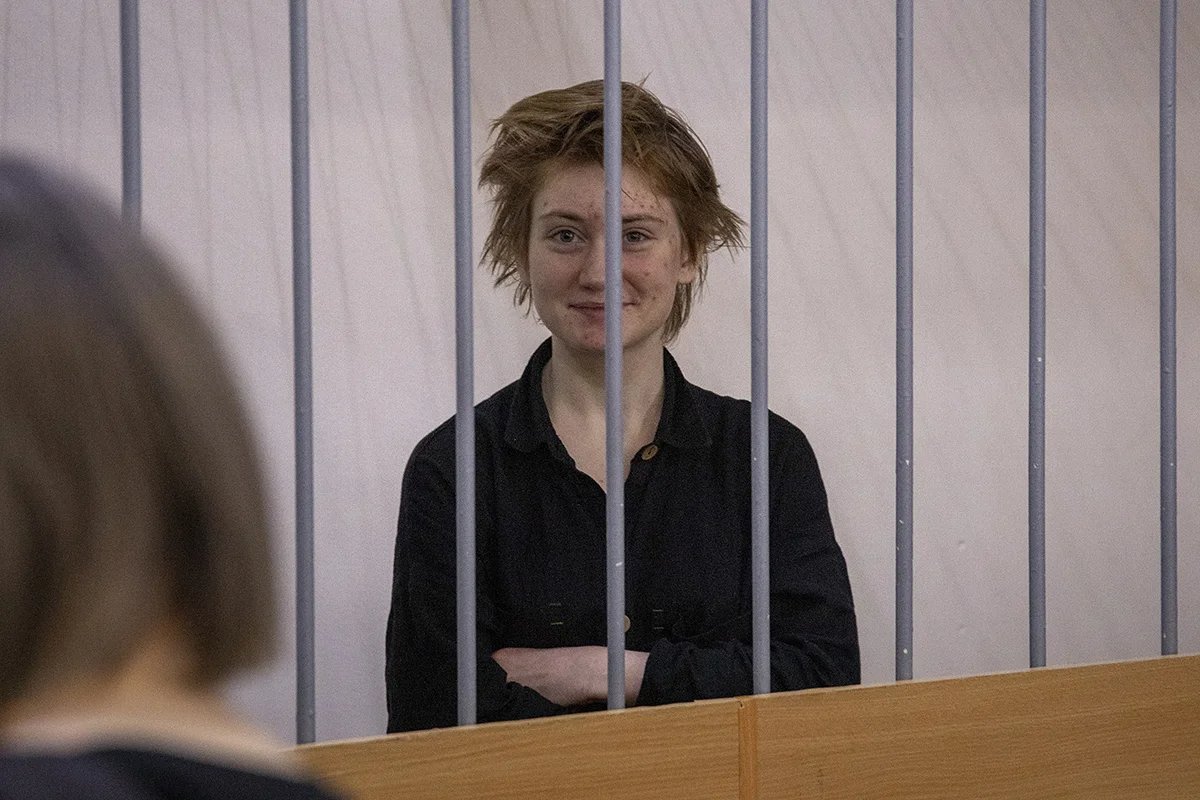
Darya Kozyreva in court. Photo: Dmitry Tsyganov
It has been a month since Kozyreva was placed in pretrial detention, but she claims to have found peace of mind. Indeed, her lawyer confirms that Darya’s spirit has not been broken, and that she remains upbeat and has no regrets.
After the arrest, Kozyreva wrote in a letter to a friend:
“It was only when I was in detention that I realised that my conscience could finally have some peace after tormenting me for two years. I could not sit idly by. I tried to do something, to write the truth, but it all seemed insufficient to me. I was painfully ashamed that I was free and warm while others were languishing in dungeons for speaking out.”
“Views are considered beliefs when they are more valuable to a person than their own skin. I value them even more. I’m not going to keep quiet. The authorities can make whatever laws they want and throw labels of extremism around as much as they like, but whenever they tell me to be silent, I will speak out — I consider it my duty. I am convinced that our main enemies are not Ukraine or America, but the authorities who dare to call themselves Russia and sit in the Kremlin.”
Join us in rebuilding Novaya Gazeta Europe
The Russian government has banned independent media. We were forced to leave our country in order to keep doing our job, telling our readers about what is going on Russia, Ukraine and Europe.
We will continue fighting against warfare and dictatorship. We believe that freedom of speech is the most efficient antidote against tyranny. Support us financially to help us fight for peace and freedom.
By clicking the Support button, you agree to the processing of your personal data.
To cancel a regular donation, please write to [email protected]
